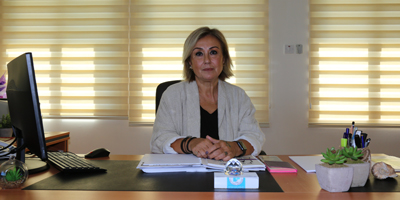EUL Academician Hablemitoğlu discussed “Covid-19 and Social Change”

Dean of the Faculty of Health Sciences, European University of Lefke (EUL). Dr. Şengül Hablemitoğlu shared information on “Covid-19 and Social Change”. Hablemitoğlu said, “We are experiencing a crisis where we will face social and economic losses due to the coronavirus outbreak. This is a humanitarian crisis, even within the scope of a natural disaster, ” she said.
“Right now, there are many people who are afraid of losing their jobs, not even getting permission for the disease, not paying their rent, and having anxiety about the future. All these concerns are not individual, the reason is not us. Yes, consumption spree, yes, uncalculated expenses etc. there are, but we cannot deny that these have been developed by the imposition of the system. These concerns should not suggest a crisis arising from our individual actions. These possible concerns are not the inevitable consequence of this global outbreak. “This is exactly the crisis of capitalism.” “In the West, governments say that by keeping Germany out of this, because there is still a very good social service system structurally, they decided to dismantle the social security network established after the Second World War. Simultaneously, the power of the working working class was deliberately fragmented. Neoliberal political ideology has been spoken as follows Let us remember Tahatcher “There is no such thing as society, there is an individual.” The epidemic came at the most critical time of this transformation. The energy of populist neoliberalism is over. This situation both created new disadvantages and increased existing vulnerabilities, deepened inequalities, ”said Hablemitoğlu, among these inequalities, retired, daily workers, those working in precarious jobs, the low wages of the workers in the service sector, economic activities that decrease with the closure of the borders, or women’s home He stated that the domestic violence increased due to his stay in the environment, the age-old individuals are at risk and lack of sufficient income, and that the problems of disabled individuals, children and homeless are among the first ones that come to mind.
“Whatever our population, the stronger our local social and economic policies, the more knowledgeable and well-equipped of our public administration bureaucrats, and the more we invest in the development of civic awareness in our country, the less damage we will get out of this crisis,” Hablemitoğlu said, He pointed out that the social welfare state governance approach of preventive, preventive and advocacy-oriented social work practices of social workers who work in the field and who are in the graduation phase will be needed.
“Besides the social impact of the epidemic, we need to think about its individual effects. While a lot is happening, trying to act as if nothing has happened, fearing the street, trying to live a life at home creates serious mental pressure. We know that what we have experienced is temporary, on the one hand, we cannot predict how long it will take, on the other hand, we feel that the world is changing somewhere. What happens after the outbreak ends? We are anxious, because we have lost the norm we know and experience. ”Hablemitoğlu stated that this epidemic that should be remembered will end somewhere and that we can protect ourselves if the correct precautions are taken and treated correctly. Hablemitoğlu said, “We have no chance to ignore what is going on and escape. So we have some quests to survive, and by accepting them, we will find ways to live from now on. So she completed his words by saying “we will build a new normal”.
